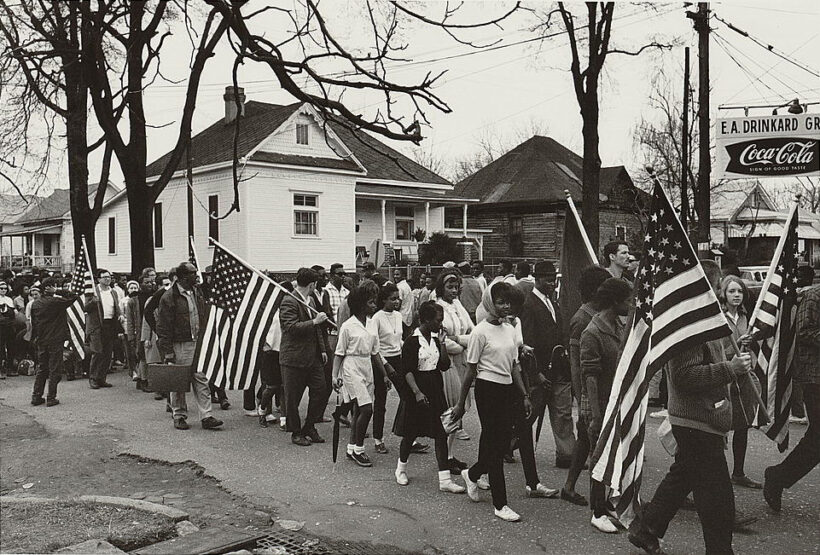In May 1901, 150 white men gathered in the city of Montgomery to rewrite the Alabama state constitution. These men elected John Knox, a prominent lawyer, to preside over the convention. In his opening speech, Knox said: “What is it we want to do? Establish white supremacy in this state […]; we must establish it by law, not by force or fraud”. He added: “To protect the sanctity of the vote in every corner of the state is our supreme duty”. The new state constitution legitimised and established a formal framework for the racism to which Black Alabamians were subjected by disenfranchising them and further entrenching Jim Crow segregationist laws.
Alabama was the birthplace of many of the greatest achievements of the civil rights movement. The Voting Rights Act of 1965 was enacted a few months after the historic voting rights march from Selma City to Montgomery, Alabama’s capital, that same year. Eighty per cent of the population of Lowndes County, Alabama, was black, yet not a single black resident of the county was registered to vote. Last November, more than 120 years after the racist Alabama Constitution was ratified in 1901, citizens finally amended it.
Today, however, both the white supermajorities that control both houses of the Alabama legislature, as well as Republican Governor Kay Ivey, who is also white, continue to take away electoral representation from the black community.
The racially biased redistricting of Alabama’s congressional districts was one such ploy. In 2021, Alabama lawmakers redrew the state’s congressional district map, manipulating the redistricting in such a way as to reduce what originally should have been two majority-black congressional districts to a single district. Civil and voting rights organisations sued, and a federal court rejected the new congressional map, finding that it violated the Voting Rights Act. The US Supreme Court upheld the court and ordered the map redrawn. The state legislature produced a new map, but defied the US Supreme Court’s order and retained only one majority-black congressional district.
This second gerrymandered map was again rejected, this time by a panel of three federal judges, two of whom were Trump appointees. In their ruling, the judges declared themselves “deeply concerned” that lawmakers had challenged the court’s authority and ordered a court-appointed arbitrator – known as a “special master” – and a cartographer to draw the new map that Alabama must use for the next presidential election in 2024.
Similar court battles to preserve black voting rights are being fought across the southern United States, with lawsuits filed in the states of Georgia, Tennessee, Louisiana and Florida. Florida governor and Republican presidential candidate Ron DeSantis vetoed the most recent map drafted by the state legislature and forced the adoption of one he pushed for. A judge rejected DeSantis’ proposed map on the grounds that it had been manipulated with racial bias.
Bishop William Barber, founder and director of the Center for Public Theology and Public Policy at Yale Divinity School, told Democracy Now! “DeSantis and his supporters don’t want to talk about what’s really going on [in Florida]. That’s why they’re illegally redistricting. Racist strategies that restrict [black] voter turnout lead to deaths, because when you restrict voting rights and disenfranchise black people, you allow extremists to get elected. They, once in office, can get in the way of access to health care, living wages and fighting poverty. And when these things are done, people die. Bad public policy leads to death. Racist rhetoric and division can create a context of death, give people license to kill. All of that is potentially deadly.
Bishop Barber spoke to Democracy Now! in the wake of yet another deadly mass shooting in the United States, this time in the city of Jacksonville, Florida. On Saturday 26 August, a white supremacist shot and killed three black people at a Dollar General shop and then shot himself. The attacker’s semi-automatic rifle had swastikas drawn on it. Law enforcement officials have strongly asserted that the massacre was racially motivated. News coverage of the mass shooting was put on the back burner when Hurricane Idalia hit Florida, but Jacksonville’s black community has not forgotten what happened.
Speaking to Democracy Now! Rodney Hurst, a Jacksonville civil rights activist, historian and writer, said: “This hurricane of racism that we’ve been dealing with in the Jacksonville community is not new. As a teenager, Hurst led protests in Jacksonville’s segregated bars, which black people were banned from attending. On 27 August 1960, on what became known as “Axe Saturday”, these young men demonstrating non-violently at sit-ins were attacked by a mob of 200 white people armed with axes and baseball bats. The shooting at the Dollar General shop coincided with an event Hurst and others were planning to hold to commemorate the 63rd anniversary of that attack. The Jacksonville massacre also occurred at the same time that tens of thousands of people gathered in Washington D.C. for the 60th anniversary of the 1963 March on Washington, the great demonstration at which Martin Luther King delivered his historic “I Have a Dream” speech.
The gains made over several decades of struggle can vanish in the blink of an eye. A variety of tactics are being used, such as removing the teaching of Negro history from state curricula, manipulating electoral maps, excluding citizens from the electoral rolls, and limiting the voting rights of communities of colour. All of this is happening right now in state legislatures across the country. Only a greater force, people power, can turn back this tide.










